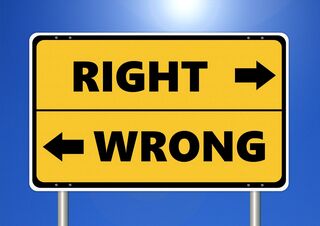Religion
Is Hugging Moral? It Depends on Your Religion
For proselytizers, the scope of morality is broad.
Posted July 29, 2020 Reviewed by Gary Drevitch

Some actions, like stealing and saving lives, clearly fall within the moral domain. Other actions, like flossing and singing off-key, clearly don’t. But many actions are ambiguous. For example, is it a moral issue to miss a religious service or to eat a cheeseburger?
Disagreement about whether actions count as “moral” is at least partially due to the fact that category boundaries are fuzzy. As demonstrated by decades of research, it is exceedingly difficult to formulate sharp demarcations of even simple categories like “bachelor." (For example, is a man in a committed domestic partnership a bachelor? What about a 13-year-old boy?) The world is largely comprised of continua, not discrete kinds, so it is frequently difficult to describe a clear set of necessary and sufficient conditions that fully determine membership within a given category.
However, trying to neatly define the moral domain is perhaps more quixotic than determining the constitution of many other categories. The issue is considerably complicated by extreme historical and cultural variations in how people think about morality.
It has long been obvious that people from different cultures make different kinds of moral judgments. Nearly 2500 years ago, Herodotus pointed out that Greeks had different moral beliefs about the proper way to respect the dead than people in surrounding societies. However, despite disagreements about how to respect the dead, people around the world generally seem to agree that respecting the dead is a moral issue (rather than an issue of convention or etiquette, for example). Therefore, a disagreement about whether an action is right or wrong doesn’t necessarily entail a disagreement about whether performing that action is a moral issue.
Do people generally agree on what counts as a moral issue, or is there variation in whether actions are thought to belong within the moral domain? I recently teamed up with a group of philosophers and psychologists to find out. Our findings are described in a paper published in the journal Social Cognition.
In our research, we recruited participants from a range of religious backgrounds and gave them a questionnaire with two sets of questions about a large range of actions. First, we asked people whether they thought that people should act in a certain way — for example, whether a person should listen quietly when elderly people speak. Then, we asked them whether this judgment was a moral judgment or some other kind of judgment.
Unsurprisingly, our participants disagreed on whether a person should or should not engage in particular actions, especially those specific to a religious tradition, like reciting prayers in Arabic or consuming blessed bread and water each Sunday.
However, we also found that there was substantial variation in whether these judgments were considered moral judgments. For example, regardless of whether participants agreed or disagreed that women should not hug men or that people should not use foul language, there was additional disagreement about whether these kinds of actions were morally relevant.
Differences in opinion about whether a given behavior should be classified as moral (or immoral) were predicted by religious affiliation. Jewish participants generally restricted the moral domain to issues related to welfare and justice. Latter-day Saints and Muslims, on the other hand, thought that the moral domain was broader and included norms prescribed by their religious traditions. Hindus did not make a clear distinction between moral and non-moral norms.

It is likely that adherence to a proselytizing religion broadens the scope of what is considered to be a moral issue. Because considering an issue to be moral increases one’s conviction in the importance of the issue and the degree to which one’s position on the issue seems to be universally applicable, moralization likely facilitates (and is facilitated by) the degree to which a person is motivated to convince others to share their values and norms.
Overall, our findings underscore the difficulty in defining the moral domain. Given that religious affiliation modulates whether certain issues are considered to be moral issues, it is unlikely that attempts to demarcate morality will ever yield consensus. Part of the reason that there is so much moral disagreement may stem from the fact that people can’t even agree on what counts as a moral issue in the first place.
References
Levine, S., Rottman, J., Davis, T., O’Neill, E., Stich, S., & Machery, E. (2021). Religious affiliation and conceptions of the moral domain. Social Cognition, 39(1), 139–165.


